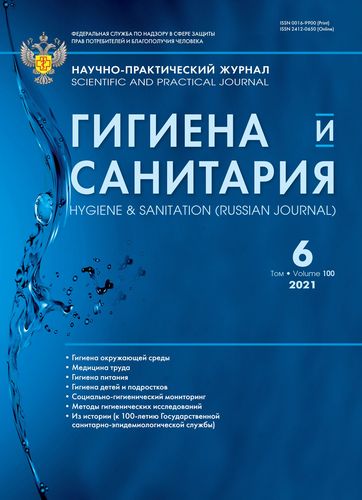Parental control in children’s overweight and obesity prevention
- Authors: Nazarova L.S.1, Daukaev R.A.1, Musabirov D.E.1, Karimov D.O.1, Baygildin S.S.1, Zelenkovskaya E.E.1, Yakhina M.R.1, Bakirov A.B.1,2
-
Affiliations:
- Ufa Research Institute of Occupational Health and Human Ecology
- Bashkir State Medical University
- Issue: Vol 100, No 6 (2021)
- Pages: 629-632
- Section: HYGIENE OF CHILDREN AND ADOLESCENTS
- Published: 14.07.2021
- URL: https://rjpbr.com/0016-9900/article/view/639304
- DOI: https://doi.org/10.47470/0016-9900-2021-100-6-629-632
- ID: 639304
Cite item
Full Text
Abstract
Introduction. Proper nutrition is one of the fundamental factors necessary for the healthy growth and development of children.
The aim of this study was to examine the role of overt and covert parental control in the formation of excess body mass index (BMI) (overweight or obesity) in children.
Materials and methods. The study included 135 residents of the Republic of Bashkortostan who had 7-11 year children with a z-score for BMI of at least -1 (optimal body weight, overweight, obesity). The collection of primary data was carried out in 2019 through a questionnaire. Statistical processing of the data was performed using logistic regression analysis, where the presence of excess BMI (overweight or obesity) in a child was considered as a dependent variable, and 25 questions characterizing the use of overt and covert parental control over nutrition were considered as covariates (Birch L.L. et al., 2001 (Child Feeding Questionnaire); Ogden J., Reynolds R., and Smith A., 2006).
Results. According to the data obtained, the risk of exceeding BMI in children increased if parents offered them their favourite food in exchange for good behaviour (overt control – restriction-reward) (B=0.361, p=0.016), and decreased if parents refrained from buying sweets and chips for home (covert control) (B=-0.374, p=0.033).
Conclusion. Parents' use of covert controls in the form of abstaining from buying sweets and chips at home, as well as refusal of such explicit controls as using a child's favorite food in exchange for good behavior, make a significant contribution to preventing the formation of overweight and obesity in children.
Keywords
About the authors
Liliia Sh. Nazarova
Ufa Research Institute of Occupational Health and Human Ecology
Author for correspondence.
Email: lilinaz19@mail.ru
ORCID iD: 0000-0002-9666-5650
MD, Ph.D., Researcher of the Department of Toxicology and Genetics of Ufa Research Institute of Occupational Health and Human Ecology, Ufa, 450106, Russian Federation.
e-mail: lilinaz19@mail.ru
Russian FederationRustem A. Daukaev
Ufa Research Institute of Occupational Health and Human Ecology
Email: noemail@neicon.ru
ORCID iD: 0000-0002-0421-4802
Russian Federation
Dmitry E. Musabirov
Ufa Research Institute of Occupational Health and Human Ecology
Email: noemail@neicon.ru
ORCID iD: 0000-0003-2042-8162
Russian Federation
Denis O. Karimov
Ufa Research Institute of Occupational Health and Human Ecology
Email: noemail@neicon.ru
ORCID iD: 0000-0003-0039-6757
Russian Federation
Samat S. Baygildin
Ufa Research Institute of Occupational Health and Human Ecology
Email: noemail@neicon.ru
ORCID iD: 0000-0002-1856-3173
Russian Federation
Evgeniya E. Zelenkovskaya
Ufa Research Institute of Occupational Health and Human Ecology
Email: noemail@neicon.ru
ORCID iD: 0000-0001-7682-2703
Russian Federation
Margarita R. Yakhina
Ufa Research Institute of Occupational Health and Human Ecology
Email: noemail@neicon.ru
ORCID iD: 0000-0003-2692-372X
Russian Federation
Akhat B. Bakirov
Ufa Research Institute of Occupational Health and Human Ecology; Bashkir State Medical University
Email: noemail@neicon.ru
ORCID iD: 0000-0003-3510-2595
Russian Federation
References
- Scaglioni S., De Cosmi V., Ciappolino V., Parazzini F., Brambilla P., Agostoni C. Factors influencing children’s eating behaviours. Nutrients. 2018; 10(6): 706. https://doi.org/10.3390/nu10060706
- Otterbach L., Mena N.Z., Greene G., Redding C.A., De Groot A., Tovar A. Community-based childhood obesity prevention intervention for parents improves health behaviors and food parenting practices among Hispanic, low-income parents. BMC Obes. 2018; 5: 11. https://doi.org/10.1186/s40608-018-0188-2
- Ogden J., Reynolds R., Smith A. Expanding the concept of parental control: A role for overt and covert control in children’s snacking behaviour? Appetite. 2006; 47(1): 100-6. https://doi.org/10.1016/j.appet.2006.03.330
- Zhou Z., Liew J., Yeh Y.C., Perez M. Appetitive traits and weight in children: evidence for parents’ controlling feeding practices as mediating mechanisms. J. Genet. Psychol. 2020; 181(1): 1-13. https://doi.org/10.1080/00221325.2019.1682506
- Reilly K.C., Briatico D., Irwin J.D., Tucker P., Pearson E.S., Burke S.M. Participants’ perceptions of “C.H.A.M.P. Families”: a parent-focused intervention targeting paediatric overweight and obesity. Int. J. Environ. Res. Public Health. 2019; 16(12): 2171. https://doi.org/10.3390/ijerph16122171
- Birch L.L., Fisher J.O., Grimm-Thomas K., Markey C.N., Sawyer R., Johnson S.L. Confirmatory factor analysis of the Child Feeding Questionnaire: a measure of parental attitudes, beliefs and practices about child feeding and obesity proneness. Appetite. 2001; 36(3): 201-10. https://doi.org/10.1006/appe.2001.0398
- Wardle J., Sanderson S., Guthrie C.A., Rapoport L., Plomin R. Parental feeding style and the inter-generational transmission of obesity risk. Obes. Res. 2002; 10(6): 453-62. https://doi.org/10.1038/oby.2002.63
- Ogden J. The Psychology of Eating: From Healthy to Disordered Behaviour. Chichester, West Sussex, UK: Wiley Blackwell; 2010.
- Wardle J. Parental influences on children’s diets. Proc. Nutr. Soc. 1995; 54(3): 747-58. https://doi.org/10.1079/pns19950074
- WHO. Growth reference 5-19 years. Available at: https://www.who.int/growthref/who2007_bmi_for_age/en/
- Eichler J., Schmidt R., Poulain T., Hiemisch A., Kiess W., Hilbert A. Stability, continuity, and bi-directional associations of parental feeding practices and standardized child body mass index in children from 2 to 12 years of age. Nutrients. 2019; 11(8): 1751. https://doi.org/10.3390/nu11081751
- Rodgers R.F., Paxton S.J., Massey R., Campbell K.J., Wertheim E.H., Skouteris H., et al. Maternal feeding practices predict weight gain and obesogenic eating behaviors in young children: a prospective study. Int. J. Behav. Nutr. Phys. Act. 2013; 10: 24. https://doi.org/10.1186/1479-5868-10-24
- Rodenburg G., Kremers S.P.J., Oenema A., van de Mheen D. Associations of parental feeding styles with child snacking behaviour and weight in the context of general parenting. Public Health Nutr. 2014; 17(5): 960-9. https://doi.org/10.1017/S1368980013000712
- Vaitkevičiūtė J., Petrauskienė A. The associations between body mass index of seven- and eight-year-old children, dietary behaviour and nutrition-related parenting practices. Medicina (Kaunas). 2019; 55(1): 24. https://doi.org/10.3390/medicina55010024
- Jansen P.W., Derks I.P.M., Mou Y., van Rijen E.H.M., Gaillard R., Micali N., et al. Associations of parents’ use of food as reward with children’s eating behaviour and BMI in a population-based cohort. Pediatr. Obes. 2020; 15(11): e12662. https://doi.org/10.1111/ijpo.12662
Supplementary files









